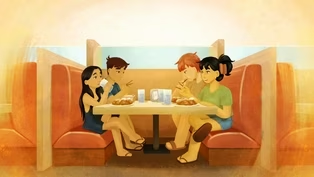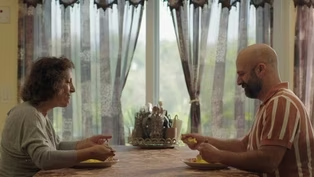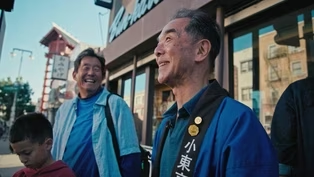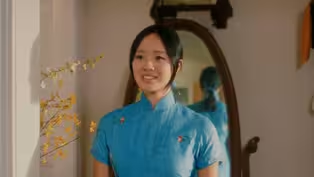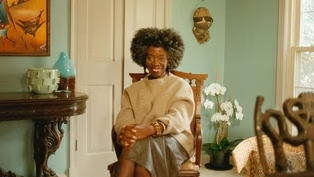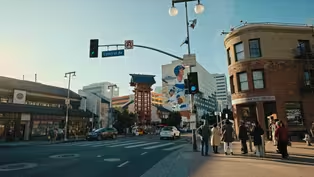
Heritage
Season 26 Episode 2 | 58mVideo has Closed Captions
Five short films from California students at Chapman, LMU & California College of the Arts.
Individuals share their experience with colorism in documentary “Stay Out of the Sun” from Chapman. A Chinese American teen struggles to fit in with her peers in “Spring” from LMU. Community leaders voice their concerns about gentrification in “Voices of Little Tokyo” from Chapman. Followed by Chapman drama “Farsi with Maman” and animated short “2392 Miles” from California College of the Arts.
Problems playing video? | Closed Captioning Feedback
Problems playing video? | Closed Captioning Feedback
Fine Cut is a local public television program presented by PBS SoCal

Heritage
Season 26 Episode 2 | 58mVideo has Closed Captions
Individuals share their experience with colorism in documentary “Stay Out of the Sun” from Chapman. A Chinese American teen struggles to fit in with her peers in “Spring” from LMU. Community leaders voice their concerns about gentrification in “Voices of Little Tokyo” from Chapman. Followed by Chapman drama “Farsi with Maman” and animated short “2392 Miles” from California College of the Arts.
Problems playing video? | Closed Captioning Feedback
How to Watch Fine Cut
Fine Cut is available to stream on pbs.org and the free PBS App, available on iPhone, Apple TV, Android TV, Android smartphones, Amazon Fire TV, Amazon Fire Tablet, Roku, Samsung Smart TV, and Vizio.
Providing Support for PBS.org
Learn Moreabout PBS online sponsorshipAnnouncer: Funding for "Fine Cut Festival of Films" is generously provided by the Bridges Larson Foundation.
♪ ♪ [Slide projector clicking] Woman: I bet I know what you're thinking: "Not another one of these shows about color."
It's funny to me how we can share some of the most intimate details of our lives with total strangers.
We'll talk about our finances, our families, even our sex lives, but bring up the light/dark thing, and-- [Loud click] ♪ [Birds chirping] Elizabeth: A friend of mine twice a year hosts a big gathering for just women friends.
There are about 15 of us.
And they took a picture, and I noticed that I was the darkest one.
And I remember saying this to a few people.
"Oh..." They'd immediately, like, go to protect me.
And I'm like, "I don't..." You know, it's fine.
It was just for me a comment.
The assumption is if you're dark, you don't want to be, if you're dark, it's bad.
And so when I would say, "Look at this picture," I thought I was-- about the color and I'd point somebody out and I'd be way darker than she was in the picture.
The assumption was that I was saying something bad about myself.
I'm just noticing.
I'm not thinking it's bad or good.
I'm just like, "Wow.
Look at this."
And that's where we are, uh, I think, still, on color.
♪ Seema: There it is.
Man: Yeah.
Seema: Yeah.
♪ I don't even think we can buy all of them out.
Like an endless supply.
Look at what it says.
"Glow & Lovely for careers..." Ooh!
"...for scholarships, career guidance, education."
[Device beeping nearby] OK, I think we're just gonna empty this out.
Woman: Hi.
Sister: Welcome.
Do you know you've become really beautiful?
Your face is fairer, glowing.
It must be marriage.
Woman: Don't you believe that?
For two months, I've been using Fair & Lovely.
It lightens the color of the skin in a natural and gentle way... Sister: Really?
Woman: and also protects the skin from the sun.
Listen to your elder sister and try it.
Younger sister: Perfect, so I'll make a beautiful bride like you.
Announcer: Fair & Lovely makes you noticeably fairer gently, safely.
[Loud click] Seema: I think they're meant to make you feel like you're not enough.
And I think they're meant to make you feel like you should constantly be trying to improve yourself.
Like, it's kind of like, your fault that you didn't try hard enough to be light skinned enough.
Colorism is really just like white supremacy in action.
Um, and like, instead of calling it, like, you know, "beauty standards" or whatever, if you just call it white supremacy, it would be so much easier to talk about dismantling it, because we all know that's, like, you know, a very pervasive, systemic injustice.
[Bar code scanner beeping] Checker: And all is there.
That's your [indistinct] card.
Seema: Got it.
Thank you.
[Birds chirping] Announcer on P.A.
: 1960 homecoming queen, Beth... [Cheering and applause] [Spectator whistling] ♪ Interviewer: How often do you think about your skin tone?
Leigh: I think about it every day.
I got a lot of preferential treatment because I was light.
And then in 1965, they wanted me to be their homecoming queen because I stopped straightening my hair.
I had an afro.
And so I sort of represented this idea people had about how you could look--be light and still look a little bit on the African side.
[Chuckling] So... Where I come from, if you're like, you're all right.
If you're brown, you can hang around, but if you're black, you got to step back.
[Slide projector clicking] [Indistinct conversation] Woman: I feel like you guys have similar skin tone, but I, think--[indistinct] is more neutral.
Bianca: What am I like?
Woman: You're warmer.
Different woman: 'Cause, like, you're good at [indistinct] angles.
First woman: You're like warmer.
Bianca: I've been told--Now I'm getting told I'm warm.
I feel like I am warm.
Different woman: But wait... Different woman: Or warmer in comparison to.
Different woman: Is it warm or does she have a redder skin tone?
Bianca: No.
I think you have red.
Different woman: Isn't red warm?
[Chuckles] Different woman: Yellow-orange is warm.
Bianca: I feel like you have... Bianca, voice-over: I was really dark compared to everyone in my family.
I heard about my skin color before they ever told me, like, I was pretty or they ever told me I was smart.
I don't know why it's always like, a topic of conversation or why people feel like, or, like, my own family members feel like that's, like, something that, like, I'm comfortable hearing about.
There was this one time my grandma told me that "You would look so much better if you weren't so dark."
I think that was, like, the first time that someone, like, told me that or made me, like, directly feel, like, I should look different and not just that I looked different.
♪ I've never heard someone, like, apologize to me for, like, making me feel, like-- I don't know--like, making me feel really bad about, like, looking different from them.
Yeah, but it's OK.
♪ [Baby laughing] Melissa: One of our kids has light skin privilege.
Another has medium brown skin privilege.
And there were a lot of people who believe that the closer you are to white, the more beautiful, the smarter, the more trustworthy and all that.
And the closer you are to black, the less of all those things.
We don't believe that.
We don't believe that at all.
But some people still believe it.
Andrew: You have multiple roles to play in determining, or at least shaping, how your child sees color.
[Indistinct singing] Child: ♪ I love the flowers, especially... ♪ Andrew: For better or worse, some people they come across will probably evaluate them poorly, and I hope that that won't lead them to be unimpressed by themselves.
[Indistinct singing] Child: Two songs.
We're singing two songs.
[Children singing, indistinct] ♪ [Music playing on laptop] Simrah: And so literally just my process, I just stare at the laptop for, like, ten hours a day.
When I'm editing people's skin tone, I usually figure out what their undertones are so that I can keep that and not change it.
I always make sure that I'm not darkening their skin or lightening their skin with the different tools I use in Photoshop.
A big reason why I started photography and photographing South Asians specifically was because I wanted to represent the unrepresented or underrepresented.
I think, like, visuals are the things that affect our psyche the most.
So I think it's all about storytelling.
[Click] Celeste: Hi.
I'm Celeste Crenshaw, host and senior producer of "Black Women On: The Light, Dark Thang."
The truth is colorism still exists in the black community.
It's a wound that continues to hurt and divide us.
What difference does all this make to you and me?
It's very simple.
By keeping the light, dark thing under wraps, we have internalized the pathology of racism, a pathology that has diminished our ability to see our own worth and the value of others who look like us.
The responsibility of eradicating the light, dark thing rests on each of our shoulders and involves redefining our cultural, political, and aesthetic values.
In tackling this issue, we must all keep in mind that we're either part of the problem or part of the solution.
My point was to--in making this was to say we have had so many years of "You're not good.
You're not worth anything," or whatever that it's just in our bones now, and you absorb it.
And so then it becomes, you know, dark--bad, light--good.
People keep making documentaries and stories on this because it still keeps happening.
♪ Jyoti: Jyoti means "light" is what I thought.
I found out that in Indian aesthetics, there's two kinds of light.
One is the light of the day-- for instance, the sunlight-- and the other is the light of the night, which is moonlight.
Jyoti basically means "the light of the night."
It automatically encompasses the duality of light and darkness coexisting and making meaning off of one another.
There is this dual nature of light and dark, and they always go together.
♪ Man: Let's go.
♪ [Dishes clank] Seema: we should press smaller...[chuckles] I think, to crush the cardamom.
Seema, voice-over: Like, in my teenage years, the Fair & Lovely messaging and, like, the general sense that people said that, "Oh, you're not going to find jobs.
You're not going to find love."
And that--not finding love--was really what really got me.
♪ This is our 18th year.
Man: In July.
Seema: We'll be 18?
Ha ha!
It's true, huh?
Like, we, as a unit, will be 18 this year.
Yeah.
♪ [Indistinct] is right.
♪ Celeste: Grandma told you about staying out of the sun, and we would run and play and play and play and just all day long out there.
But there was always a comment at the end of the day of just, "Oh, my gosh.
She's gotten so dark."
Interviewer: If you had children of your own, how would you want them to perceive themselves?
Bianca: I don't want them to feel like they have to stay out of the sun when all of their friends are, like, outside playing games.
I want them to just be.
♪ [Loud splash] ♪ [1960s-style R&B music playing] ♪ Mother: Ranran?
Ranran?
Ranran?
[Clicks radio off, music stops] How was school today?
Ranran: Uh...it was OK.
Mother: Do you want to invite some friends to our house this weekend?
Ranran: Everyone's already going to Jennifer's party.
Mother: Aren't you going to join them?
Ranran: I wasn't invited.
[Woman singing in Chinese on recording] ♪ [Conversation in Chinese] [Shuts off radio] Ranran: No one else I know makes that stuff.
Mother: Are your classmates saying things about you again?
Ranran: No.
Everything is fine.
[Telephone receiver placed on cradle] Mom, Mom!
I just got invited-- I got invited to Jennifer's party.
Mother: Oh.
That's wonderful.
Ranran: Um, Mom, what do you think about this skirt?
[Conversation in Chinese] Mother: Grandma will make you a qipao.
Ranran: Ohh, But she doesn't understand anything.
She'll just ruin this for me.
Mother: Grandma used to be a seamstress.
How could she not understand?
[Conversation in Chinese] Mother: That's when we're celebrating with Grandma.
Ranran: But I never understand what she says.
[Mother speaking Chinese] Ranran: Why can't Grandma learn English?
She's been here for 15 years.
Mother: Ranran...shut it.
[Ranran exhales] Ranran: Fine.
[Coins clink and rattle] [Rattling] [Sewing machine running] Grandma: Ranran... [Speaking Chinese] Mother: Grandma spent two days to make the dress.
Isn't it nice?
[Grandma speaking Chinese] [Grandma exhales] Mother: You should wear it tonight to show your friends.
Ranran: I will.
Oh, and can we leave now?
I want to buy Jennifer a gift.
Mother: Yeah.
Have fun.
Don't come back too late.
Ranran: I won't.
[1960s-style R&B music playing] [Boys speaking, indistinct] Boy: I can't believe she talked to me.
Ha ha!
[Continues, indistinct] Mother: Ranran.
Ranran... [Continues in Chinese] Ranran: I took it off, OK?
[Grandma speaking Chinese] Ranran: I bought this with my own damn money, OK?
Just leave me alone.
Mother: Ranran, stop being so disrespectful.
Ranran: I never even wanted to wear this stupid dress.
[Grandma speaking Chinese] Ranran: I don't want to be different, OK?
I was born here, raised here, OK?
Both of you can't even understand that!
Mother: How can you say this to us?
Ranran: You know, I wish you weren't my family.
[Sighs] Grandma: Ranran, I need to talk to you.
Ranran: Grandma, how can you speak English?
I thought that you didn't know English.
Grandma: I learned English when I was in Shanghai.
And I've been here for 15 years.
Ranran: Then how come you never say it?
Grandma: Huh.
I miss home.
Speaking my native language makes me feel better and closer to it.
I remember where I was born.
I was surrounded by marshes.
I used to go fishing there every day.
Then the war broke out.
I was separated from my parents.
For years, I was wandering and displaced.
Later, my parents were--died.
Never went back home.
Ranran: I--I didn't know that.
Grandma: Ranran, did anything happen at the party?
[Ranran sighs] Ranran: I keep trying to be like them, but they still make fun of me.
Grandma: You know what you should say to them?
Next time, if they do that to you again, just say... ... [Laughter] ♪ Ranran: Grandma, I'm so sorry about the dress.
I didn't mean to ruin it.
Grandma: It's OK.
Hey, let's fix it together, OK?
Hmm?
Come on.
Let's go.
♪ Ranran: I actually got it through.
Ha ha.
Grandma: Yes, exactly, because you have sharp eyes.
See... Good.
Don't be so close to it.
Ranran: Yeah.
This is good.
♪ Ranran: Just one minute.
Mother: So pretty.
Ranran: I know.
[Grandma chuckles] Grandma: [Indistinct].
[Ranran speaking Chinese] Grandma: No, no.
You're better than that.
[Laughter] [Woman singing in Chinese] [Mother sniffles] [Indistinct conversation] ♪ Mother: Then you want to do light meat or you want to do pork?
Ranran: Can we do the pork?
Mother: Yes!
You like that... Ranran: Yes.
I love this one.
I want a lot.
Mother: Maybe Grandma wants it, too.
So you want to make that for her?
[Continues, indistinct] Mother: Yes, go ahead.
[Indistinct conversation] [Song continues on soundtrack] ♪ ♪ Woman: Little Tokyo, to me, in one word would be vibrant.
You want to be here.
It's the place to be.
My mother worked in a sewing factory, so as a child, I used to take the bus all by myself and meet her here in Little Tokyo.
It was like a time where I could get a snow cone, Japanese noodles, and of course, my favorite, rice paper candy.
Man: When I was going to USC, I started working part-time at a small bank, and I recall walking around the neighborhood.
I became more intrigued about the especially older parts of Little Tokyo.
Different man: I had a lot of fun going down there for Nisei Week.
What I liked was the Nisei Week car contest because everybody, all the teenage kids 'cause they used to all, like, soup up their cars, you know, and bring it out there.
So you used to see all these, you know, '65 GTOs, you know, all these muscle cars, you know?
Different woman: The very first project I did was at Casa Heiwa, and it has a fan at the entryway.
I had metal pieces that had silkscreen photographs of people in the community.
So all of the photos, all these kids nowadays are all grown-up and have their own children, so it's fun to look at now.
♪ ♪ ♪ Michael Okamura, voice-over: Little Tokyo, to me, represents historic continuity because Little Tokyo this year is celebrating its 140th anniversary.
People have mentioned that I'm a fixture here.
With me being involved in Little Tokyo so much, I am a continuum of my grandparents being here in the 1920s.
So when I walk the streets of Little Tokyo, giving tours, it feels I'm literally walking in their footsteps.
♪ The first few decades of the early 20th century, more migration occurred from Japan to Los Angeles.
Little Tokyo was becoming more developed.
It was a community, a living community, a thriving community in the 1920s and 1930s.
♪ In May of 2024, Little Tokyo was recognized as one of the 11 most endangered sites in the United States.
Reporter: Urban renewal, gentrification, covid, online shopping.
All of these have contributed to the shrinking of the Little Tokyo community.
Activist: We are not a tourist trap.
Little Tokyo is fighting back.
Different reporter: What they're fighting against is the $2-billion mega development that's proposed to be built at Fourth and Central on the southernmost section of Little Tokyo.
Activist: He claims there are gonna be lots of jobs, but what we see is a 44-story monstrosity facing us on the south end of Little Tokyo.
It's going to change Little Tokyo forever.
In my entire life, I never thought I'd be an activist.
As a small child, I resented being an immigrant, I resented being a Japanese, you know?
The years of being made fun of for being an FOB, the years of being told that rice balls look ridiculous, all that stuff leads to anger and resentment.
Those things are the ones that lead to activism in my case.
You picked the wrong people, dude.
David Monkawa, voice-over: The Fourth and Central project is just another part of the 50-, 60-year struggle to keep Little Tokyo alive.
November 20th is the final hearing for the environmental impact report.
If this environmental impact report is approved, they're going to go on and build it.
[Clock ticking] Official: OK, are we ready to get started, everyone?
Good morning, everyone.
This is the scheduled public hearing for the Fourth and Central project, as well as the planning, entitlement requests for this hearing.
Before... David: Somebody put it up like this.
I'm going to put it up like this, and then I'm gonna go like this.
Edgar Khalatian: Good morning, everyone.
My name is Edgar Khalatian, and I am a partner at the Mayer Brown law firm.
And I am here today on behalf of the applicant, CP LA Cold Storage Land.
The project proposes to replace the existing industrial uses on the project site with an exciting mixed-use development that will infuse the area with a dynamic mix of residential, office, retail, and restaurant uses.
♪ Woman: I've been in and around Little Tokyo for so long, there's lots of stories.
Right now I'm in the community and doing my art.
I did a lot of collage paintings using Japanese papers, so this is probably one that I did in the '90s.
This building is Tokyo Villa.
It's the first condominium project that was built in Little Tokyo.
Nowadays, with the prices of rents and the housing crisis, it's really difficult to get some kind of unit like this.
I think they were going to build a new development at the Cold Storage space, which is just a block away from here.
If you don't live here and if you don't know the communities, you think, "Wow.
That's a really great thing.
You know, that's a good place to put that project."
But take into consideration the people that are living here now, can they afford to stay in the neighborhood?
Because taking into consideration the people that are living here now, can they afford to stay in the neighborhood?
Because the rents will definitely go up.
And it's such a shame because they just go in and then they just bulldoze their way through and don't think about the people that are actually living there.
♪ [Indistinct radio chatter] ♪ Woman: I was in high school, a senior in high school, so I had started Rafu Bussan one year prior to this, because I graduated Roosevelt in 1974.
Rafu Bussan, after the Kawaratanis took over in 1958, has been in business for 64 years.
♪ The first time we moved, we had no choice.
It was eminent domain.
They were going to get rid of some of the stores on historic First Street and create the now Japanese Village Plaza.
I'm very aware of, like, we have the Cold Storage project.
Our main concern is, How are they going to connect with our community, with Little Tokyo?
Part of gentrification is only these big companies can afford the rising rent, so it's a huge concern for me.
The Daruma, traditionally a papier-mache product with the red, the white, the black and then the gold leaf accent, our biggest importer gave it to us to wish us to rise.
The Japanese saying for the Daruma is "Nana korobi ya oki," which means, seven times fall, each time you rise, and on the eighth occasion, you stay up.
I take it as humankind perseveres against all hardship and you rise.
♪ David: Bonsai is a pain in the ass.
Like, each bonsai tree might be a couple hundred years, so during their lifetime, they get transferred to different owners.
This one's about--about 75 years when I got it.
Because, you know, I got another 20 years left, so I got to give it to somebody else so they'll take care of it.
Interviewer: Sounds like what you're doing with Little Tokyo.
David: Kind of.
I just hope someone takes it up is all.
In your mind, I'm going to ask you to visualize the Little Tokyo parcel in 1938, 1940.
♪ In 1953, Parker Center, the cop station, they wanted 1/4 of Little Tokyo for that.
Michael: Through eminent domain by the City of L.A., the city took over the entire quadrant.
The Japanese community, they did not want to fight city hall, because they had just returned to Little Tokyo from leaving the concentration camps.
Once you left the camp, you were vulnerable to everyone, to American society who did not want you.
My family, both of my parents being incarcerated in the concentration camps, all that psychological trauma that my parents and their parents and all the families went through, it got passed down to the next generation.
♪ David: Hi.
My name is David Monkawa.
I'm the chairperson of Little Tokyo Against Gentrification.
We oppose this horrific project as is because it does not provide enough housing.
It does not address the key issues that affect our community.
Look at the way Little Tokyo is from our point of view.
In 1942, with the concentration camps, 90% of Little Tokyo got amputated.
In 1953, with the police station another 1/4 of Little Tokyo--of what remained--was taken away.
During the 1970s, hundreds of working-class people were evicted to make way for a luxury hotel.
And now, and now this development that Mark Falcone is bringing will finally slice up the rest of Little Tokyo.
Man: My family and I are concerned about the present and future status of Little Tokyo.
We support maintaining the community culture of Little Tokyo and oppose gentrification that drastically changes that culture, so that Little Tokyo does not become a hollow shell of itself for the sake of profit.
Different man: Just in the last couple years since the new metro station, we've already lost over 50 small businesses due to rising rents.
We've been here for over 140 years, despite a history of systemic racism and displacement.
And we have a vision for the future.
I invite you to read it.
Abigail Chan: I just want to point to the voices that are here with me, the people who are speaking in opposition to this project.
They aren't here because they stand to gain jobs or profit or foot traffic.
They're here because they love this neighborhood.
There are people who have shepherded this neighborhood through decades of encroachment.
So when they tell us to be worried, we get worried because they've seen Little Tokyo through all of these years, and they know what it takes to keep the community alive.
♪ ♪ [Birds chirping] [Man speaking Farsi] [Clears throat] Um...and although I would forget how to speak it for a while... [Continues in Farsi] ...water.
[Toilet flushes] [Continues in Farsi] ♪ Teacher: Uh.
Poo-yeah?
♪ [Pooya speaking Farsi] [Laughter] Man: Hello, neighbor.
Will you be my friend?
Pooya: Hello, neighbor.
Will you be my friend?
Ha.
[Laughter] Mom: Peter.
Pooya: My name.
My name is Peter, like Peter Parker.
[Mom speaking Farsi] Pooya: No.
It's not Pooya.
No one in school can say it-- Pooya.
Peter.
[Pooya speaking Farsi] ♪ Um... [Continues in Farsi] [Pooya sighs] After that, I'd only come home for a day at a time to have a meal.
[Turns page] [Continues in Farsi] [Sighs] leftovers... [Continues in Farsi] Um, meet..."kardan."
[Continues in Farsi] ♪ [Bedsprings squeaking] Wait.
No.
Uh... [Continues in Farsi] Yeah.
Just a little bit slower, Mama.
[Conversation in Farsi] ...we understood each other less and less.
[Mother speaking Farsi] Pooya: Oh.
Heh.
Sorry.
Ahem.
Just a little slower, Mom.
A little slower.
[Pooya continues in Farsi] ...happened keh important... [Continues in Farsi] ♪ ...uh... was being weird.
♪ [Pooya continues in Farsi] ...acting different.
Father: Oh, you want a burqa?
You're going to look like a walking beehive... Tiffany: It would be my choice.
Father: ...terrorist acts.
OK.
You believe what you want to.
They're a cancer.
They're a disease on our society.
They need to be expunged.
I'm done here.
Mother: Unbelievable.
Peter, I'm sorry.
He gets upset.
But we know your family is probably one of the good ones.
[Pooya speaking Farsi] Teacher: Salam.
[Teacher speaking Farsi poorly in American accent] [Pooya speaking Farsi] I realized... [Continues in Farsi] [Sound of pencil scribbling] [Mother speaking Farsi] ...leftovers... [Continues in Farsi] [Mother inhales] [Exhales] Pooya: ...virtually continue... [Continues in Farsi] [Pooya sniffles] ♪ ♪ [Rain] Woman: No way.
Woman 2: Yeah way.
You always find something and then help me find something after.
Woman 1: Cannot give up.
That's why.
Gotta keep looking until you find them yourself.
The shells call.
You just got to answer.
Woman 2: Hmm.
I don't know.
I think it's better when you're here.
We'll just go when you get back.
Woman 1: I need to.
I'm getting so pale.
Woman 2: Girl, that's-- OK.
Hold on.
Girl, sorry.
I gotta go.
I'll call you back in a little bit.
Woman 1: Nah, I gotta go to sleep anyways.
Woman 1: OK.
I'll talk to you later.
[Computer beeps 3 times] [Water running] [Birds chirp] [Water pouring] [Wind blowing] [Water pouring] [Turns water off] [Sound of wave breaking] ♪ [Click] [Indistinct chatter] [Click] [Splash] [Muffled sounds of waves breaking] [Indistinct chatter, laughter] [Click] [Click] [Indistinct chatter] [Object knocked back and forth] [Rapid tapping] [Click] ♪ [Sound of waves breaking] [Laughter] ♪ [Sound of sea gulls calling] ♪ [Muffled sounds of waves breaking] [Muffled sounds of waves breaking] [Birds chirping] [Indistinct chatter, laughter] ♪ [Meow] ♪ Announcer: Funding for "Fine Cut Festival of Films" is generously provided by the Bridges Larson Foundation.
Video has Closed Captions
Clip: S26 Ep2 | 5m 3s | Flowing water and memories, the mind's journey to find home. (Kai Ho/California College of the Arts) (5m 3s)
Video has Closed Captions
Clip: S26 Ep2 | 10m 9s | An Iranian-American recounts his relationship with the language he forgot. (Omid Iranikhah/Chapman) (10m 9s)
Preview: S26 Ep2 | 30s | Five short films from California students at Chapman, LMU & California College of the Arts. (30s)
Video has Closed Captions
Clip: S26 Ep2 | 10m 58s | A Chinese American teen in 1960s California struggles to fit in at a party, (Xiaoxi Qin/LMU) (10m 58s)
Video has Closed Captions
Clip: S26 Ep2 | 14m 51s | A scrapbook documents experiences with colorism. (Zola Franchi, Vivienne Ayres, Nidhi Kumar/Chapman) (14m 51s)
Video has Closed Captions
Clip: S26 Ep2 | 14m 57s | Little Tokyo residents voice concerns with a mega development proposal. (Nana Nakano/Chapman) (14m 57s)
Providing Support for PBS.org
Learn Moreabout PBS online sponsorship

- Arts and Music
The Best of the Joy of Painting with Bob Ross
A pop icon, Bob Ross offers soothing words of wisdom as he paints captivating landscapes.












Support for PBS provided by:
Fine Cut is a local public television program presented by PBS SoCal
